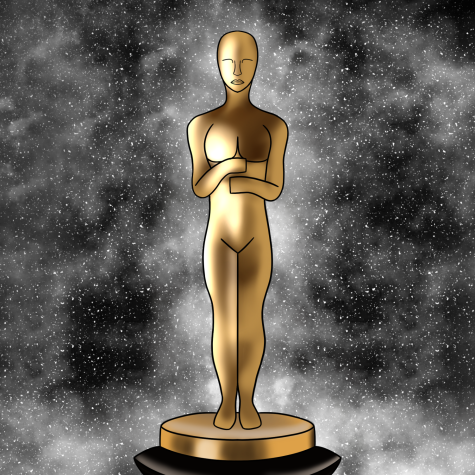Oscars return falls short
“CODA” wins big, but artists overshadowed by controversy
April 1, 2022

After three years of ceremonies without a host, and a couple of years when moviegoing was marred by the COVID-19 pandemic, the Academy Awards returned, hosts and all, on March 27, 2022.
While the ceremony was filled with a number of memorable moments, and some infamous ones, it was disappointing overall. The art and the artists that the show is meant to honor were thrown aside for cheap attempts at gaining viewership.
A number of worthy films were up for Oscars this year, including Ryusuke Hamaguchi’s “Drive My Car” and Paul Thomas Anderson’s “Licorice Pizza,” but as the ceremony dragged on for its three-and-a-half hour runtime, it became clear that poorly executed attempts at audience engagement and tone-deaf jokes made by hosts were all that ABC was interested in providing audiences.
Controversy plagued the show before the cameras started rolling, as ABC made the extremely controversial decision to cut eight categories from the live broadcast and present them in the Dolby Theater before the official ceremony started.
A slap in the face towards the hard below-the-line work that goes into making a motion picture, the winners were announced to the public through Twitter; they were eventually shown in a cut-down format in the middle of the ceremony. The relegation of these categories to a ‘second class’ ceremony made ABC’s feelings on the show clear—the Oscars exist as an opportunity for ABC to gain viewership, not to truly honor cinema.
Every decision during Sunday night’s show, including the de-televisation of certain categories, felt disrespectful towards the art and artists that the Academy was designed to honor.
During the seemingly endless stream of monologues during the night, hosts Amy Schumer, Regina Hall and Wanda Sykes continuously poked fun at having not seen certain Best Picture nominees, with Sykes even joking that certain films, including Netflix standout “The Power of the Dog,” were too boring to finish in one sitting.
This trend continued throughout the ceremony, with later jokes taking aim at the commercial failure of Ridley Scott’s “The Last Duel,” and one particularly painful bit by Schumer referring to renowned actress Kirsten Dunst, who was at the ceremony as a nominee for her performance in “The Power of the Dog,” as a seat-filler.
These unwarranted jabs at artists were rarely talked about by viewers after the show, however, as one particular event late in the evening seemed to dominate all future conversation regarding this year’s Oscars.
When presenting the award for Best Documentary Feature, which ended up going to Questlove’s amazing construction of previously buried footage of the Harlem Cultural Festival in “Summer of Soul,” comedian Chris Rock was given a joke regarding actress Jada Pinkett Smith’s shaved head, in which the comedian referred to Smith’s next picture as “G.I. Jane 2.”
J. Smith’s husband, Will, did not take kindly to this joke, as J. Smith has been extremely open with her struggles with alopecia and hair loss. In response, W. Smith took to the stage to slap Rock, afterwards telling the comedian to “Keep [Jada’s] name out your [expletive] mouth.” In a controversial move, Smith was allowed to stay inside of the Dolby Theater, creating an uncomfortable environment that engulfed the remaining runtime of the show.
W. Smith would later go on to win the award for Best Actor for his portrayal of Richard Williams in “King Richard.” This, along with the subsequent standing ovation that W. Smith received after his acceptance speech, raised the ire of many celebrities, including Jim Carrey, who believed that W. Smith should have been escorted out of the theater for his actions, calling the Academy spineless.
The night was not a complete loss, however, as the ceremony still had quite a few bright spots. The first award of the night went to Ariana DeBose for her role as Anita in Steven Spielberg’s re-imagining of “West Side Story.” In her rousing acceptance speech, she expressed how her win on Sunday emphasized the idea that there is a place for those who Hollywood regularly excludes, a sentiment she personally experiences as a queer Afro-Latina woman.
In a similarly moving moment, “CODA” star Troy Kotsur, who is only the second deaf actor to win an Academy Award, thanked director Sian Heder for being a bridge between the deaf community and the hearing community. The film, a surprise smash out of Sundance, went on to win Best Picture.
Despite these bright spots, ABC’s televisation of the 94th Academy Awards singled in on attaining viewership rather than celebrating the best of the year in cinema. This awards show won’t be winning any awards.

























































































